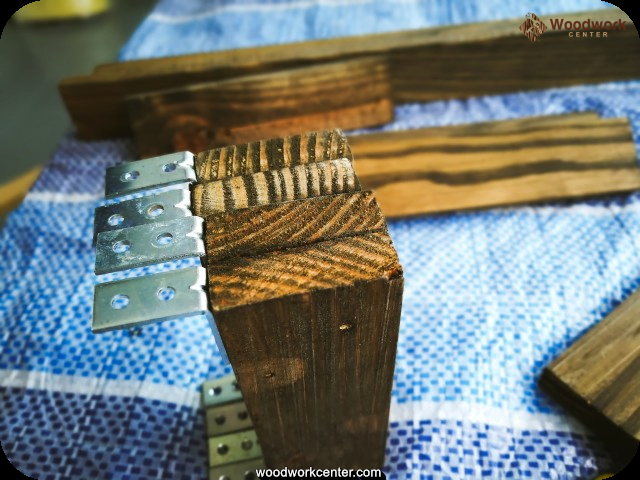Introduction to Woodworking Tools & Supplies
Woodworking tools and supplies are essential for anyone who wants to make something out of wood. There are many different types of tools available for use in a variety of applications, ranging from basic hand tools to sophisticated power tools. The most common tool used in woodworking is the saw, which can be a handheld or stationary type. Other essential hand tools include chisels, planes, rasps and hammers. For more advanced projects, router tables, jointers, biscuit machines and other power equipment may be used.
In addition to these tools, there is also an array of supplies needed for any given project from lumber and hardware items like screws and nails to stains, finishes and glues. An important part of successful woodworking is knowing how to choose the right material for the job at hand as well as learning all of the necessary skills, techniques and safety protocols behind using the products effectively.
When it comes to shopping for woodworking supplies, it can be helpful to consult with experienced professionals who specialize in this area in order to get advice on what specific items would work best for a project. It’s also helpful to read reviews online or shop around in person before making a purchase so you can be sure that you are getting quality materials at a fair price. Additionally, it’s important to remember that while many stores may discount some materials due to seasonality or promotions, buying quality materials from reputable vendors is always a good idea if possible in order to ensure better results when working with your projects.
Woodworking Tool Categories
Chisels: Chisels are used to cut recesses, shallow mortises and other accurate cuts in wood pieces. There is a wide variety of chisels available that range from bevel-edged firmer chisels for general woodworking tasks to detailed carving chisels for more intricate work.
Saws: Saws feature cutting blades specifically designed for different tasks. Common saw types include backsaws, coping saws, crosscut saws and tenon saws. Backsaws are great for precise joinery work, while crosscut saws cut broad grain accurately, making them suitable for either crosscutting or rip-sawing boards. Coping saws are small hand-held tools used for cutting curved shapes. These can be used for detailing or forming specialized shapes and joints.
Planes: Planes are primarily used to remove material from surfaces of rough stock or finely trim and finish parts once they are close the desired shape and size. The main types of planes typically found in a workshop include a jack plane (for stock removal), smoothing plane (for finer finishing) and a block plan (finer detailed work).
Routers: Routers come in two basic forms ” handheld and table mounted ” with both being incredibly useful in almost any woodworking project. A handheld router will usually have depth stops as well as a guide fence that can easily be adjusted to get the desired results while using this versatile tool on various materials. Table routers offer increased motor power along with precise adjustments throughout the cut creating very accurate cuts in hard woods or finished veneers .
Drills & Drivers: Drills are unarguably the most important tool for making holes in wood quickly and accurately, but coming equipped with multiple drill bit sizes ensures you always have the right one available when you need it. Drill drivers take convenience up one notch ” being able not just drill holes but drive screws into place with variable speed accuracy allows even quicker dexterity when working on projects throughout your shop.
Essential Woodworking Supplies
When embarking on a woodworking project, it is important to have the right tools and supplies. Even more essential, however, are the basic supplies required for any successful woodworking project.
One of the most important supplies needed is the wood itself. Most projects are made from hardwoods such as oak, ash, cherry, or cedar. Softwoods like pine or plywood can also be used for specific tasks. When selecting the type of wood for a project, it’s important to consider the desired look and finish of the finished piece. Woods should be measured and cut with precision according to a plan or template.
Another necessary supply for woodworking projects is fasteners like screws and nails to join pieces together during construction. Other essentials include power tools (drills, saws) for cutting and assembling pieces; clamps for securing joints; sandpaper in a variety of grits for shaping and prepping surfaces; adhesives like glue or epoxy to secure pieces together before fastening; finishing materials such as varnish to protect surfaces; router bits and drill bits in various shapes and sizes; specialized chisels; gouge bits; dowels; dowel jigs; miter boxes; router tables; saw boards; abrasive blades, grinding stones/wheels, files, rasps/planes // etc..
Woodworkers also need basic hand tools like hammers and screwdrivers in addition to protective equipment including safety glasses and gloves. In order to give projects a professional finish, an assortment of paints, stains, sealants,, brushes and various applicators may come in handy depending on the complexity of the project at hand. All of these products will enable woodworkers to create beautiful projects with minimal effort in no time at all!
Evaluating Woodworking Tools & Supplies
When evaluating woodworking tools and supplies, it is important to consider the quality of the material as well as its purpose. Professional-grade tools are usually made with higher levels of precision which allows for less errors, greater accuracy and better overall performance. Look for tools and accessories that have wear-resistant components, durable materials and an ergonomic design. Investing in high-quality supplies ensures that the results with last long-term.
In addition to assessing tool quality, it is also essential to consider how these items will be used in practice. Consider the available features or any additional mechanisms or add-ons that may enhance your workflow and efficiency when working on a project. It is important to read product descriptions carefully and research individual pieces before making a purchase. Seeking out customer reviews can help provide further insight into what users have thought of, especially on multi-purpose items or those with specific intended craft applications.
For materials such as wood and paint, it is necessary to understand the specifics ” such as moisture content and application techniques ” so that you can best choose a combination that is suited for your woodworking task at hand while still achieving desired results. If you are uncertain about the selection process, working closely with a knowledgeable sales person or consultant can enable you to find the right combination of tool kits, supplies and hardware for a successful outcome.
Woodworking Tool Care & Maintenance
Proper tool care and maintenance is essential for keeping your woodworking tools in optimal condition. To ensure that your tools work safely and efficiently, it’s important to inspect them regularly to make sure they are functioning properly. Make sure blades are sharp and replace any broken parts or components as necessary. Furthermore, any contact surfaces should be kept clean and lubricated with a light oil so they continue to function smoothly.
In addition to tool care, it’s also important to store your woodworking supplies properly. Wood can become warped or cracked due to exposure to moisture or extreme temperatures. To prevent this from happening, store wood in cool dry places away from direct sunlight and strong drafts. Additionally, use different types of protective sealants on both finished pieces and raw material such as glue, varnish, wax etc., to protect against scratches, scuffing and water damage. Finally, keep all tools separated in cases or boxes when not in use so they’re easy to find when you need them.
Best Brands for Woodworking Tools & Supplies
Woodworking is one of the most popular DIY activities, so it’s no surprise that it requires a variety of specialized tools and supplies. Investing in the right set of woodworking tools can ensure that your projects turn out just as you envisioned them when they are complete. Knowing which brands produce the highest-quality woodworking tools and supplies is critical if you want to ensure success with your woodworking projects.
Some of the leading brands for woodworking tools and supplies include Grizzly Industrial, DeWALT, Rockler Woodworking & Hardware, Bosch Tools, 3M ScotchBlue, Ridgid Tools and SawStop. Grizzly Industrial produces a wide range of equipment for craftsmen and shop owners who need high-power sanders or routers. The company also offers an extensive line of grinders for proficient sharpening results. DeWALT provides a comprehensive selection of tools including drills, circular saws and hammer drills that are designed to exceed expectations in tough working circumstances. Rockler produces materials such as drill bits, jigsaws blades and boring bits as well as furniture hardware such as hinges and locksets.
Bosch Tools is well known for its superior combination hammers which provide amazing strength and power while using less fuel than traditional models. 3M ScotchBlue manufactures masking tapes specifically designed for clean lines when painting and other finishing tasks. Ridgid Tools provides durable solutions for professional contractors who require outstanding performance from their power tools at all times. Finally, SawStop offers top-of-the-range professional cabinet saws that come along with flesh sensing technology for safety purposes. With products like these from these industry-leading manufacturers anyone should be able to turn their dream projects into reality with ease ” even beginners!
Finding & Purchasing Woodworking Tools & Supplies
With woodworking, having the right tools and supplies is essential for any project, big or small. To get the most out of your woodworking projects and make sure that your work is high-quality, it’s important to make sure that you purchase the best tools and supplies available. But knowing where to look and how to get the best prices can be a challenge.
To find the right tools and materials for your needs, start by researching different stores, both online and in-person. Read up on product reviews before deciding to buy something and take advantage of discounts when available. Additionally, reputable websites like Woodworkers Supply provide detailed reviews on different tools so customers can quickly compare features between items before they decide which one to go with.
Once you’ve found what you need and are ready to purchase, don’t forget that it pays to shop around! Different stores have different prices for some items and if you’re following a budget there may be an opportunity for significant savings if you take enough time searching for special deals and sales. Don’t be afraid to reach out to multiple retailers for price comparisons as well; even if a store doesn’t publicly advertise a discounted item, they may still have something specific or unique that could help lower costs.
Finally, consider bulk buying options when possible. Especially if there’s an item you know will continue to be used for future projects or if there are multiple people who will require the same item in their households; buying in bulk can often lead to additional discounts that could save a lot of money over time.
Final Thoughts
Woodworking tools and supplies are an important part of any project. The right tools and supplies can make the difference between a successful, beautiful outcome and a shabby, disappointing result. It is essential to ensure that you choose the best woodworking tools and supplies for your project in order to get the most out of it. There are a few key points to remember when selecting the right tools and supplies for your woodworking project:
1. Quality Matters: Invest in high-quality tools that are made from materials that will last. Spending more for these types of tools can save time, money, and frustration in the long run.
2. Research Devices: Learn what different devices do before you make any purchases so that you know you’re getting a tool that fits your needs.
3. Choose Appropriate Tools: Make sure that you select the appropriate type of equipment depending on the woodworking job at hand. For example, circular saws work great for making basic cuts while router tables are excellent at creating decorative edges or intricate shapes.
4. Safety First: Safety should always be at the forefront of your mind when working with power tools or machinery ” no matter how experienced you are with woodworking!
Following these steps can help ensure you make smart decisions when selecting woodworking tools and supplies that suit your needs and project goals while also helping ensure safety in the workplace as well.

Hi everyone! I’m a woodworker and blogger, and this is my woodworking blog. In my blog, I share tips and tricks for woodworkers of all skill levels, as well as project ideas that you can try yourself.





